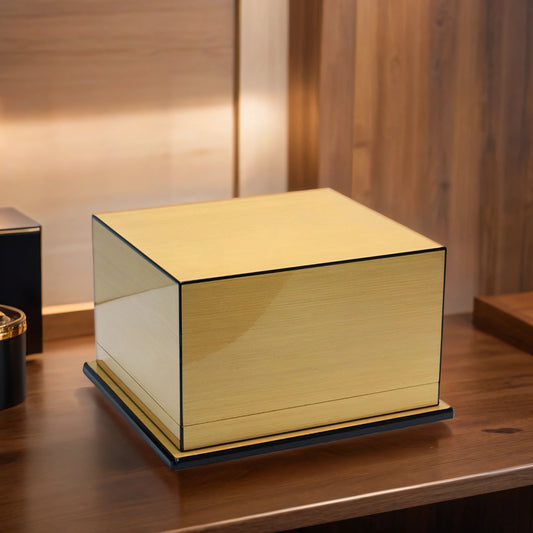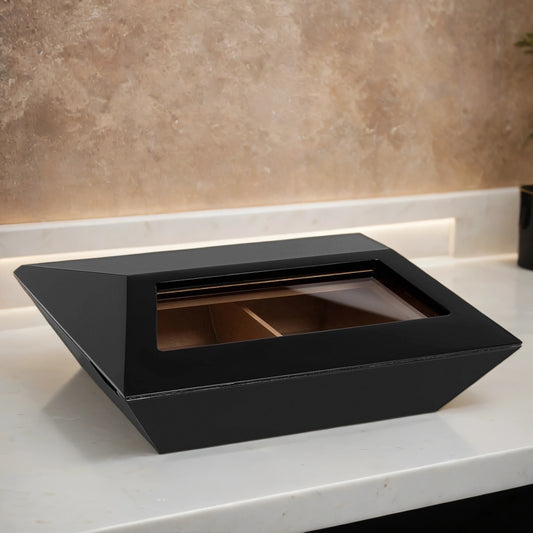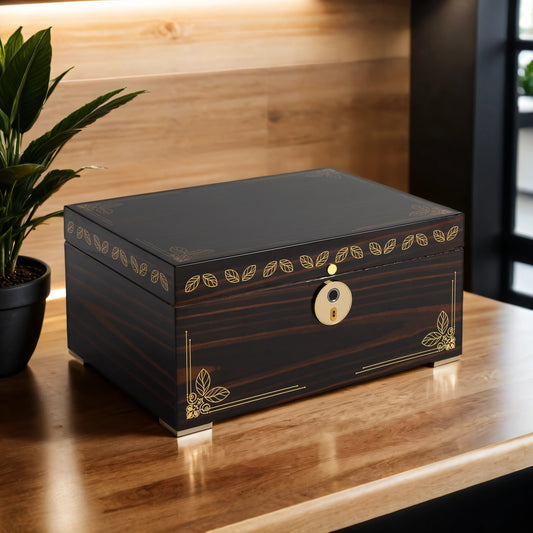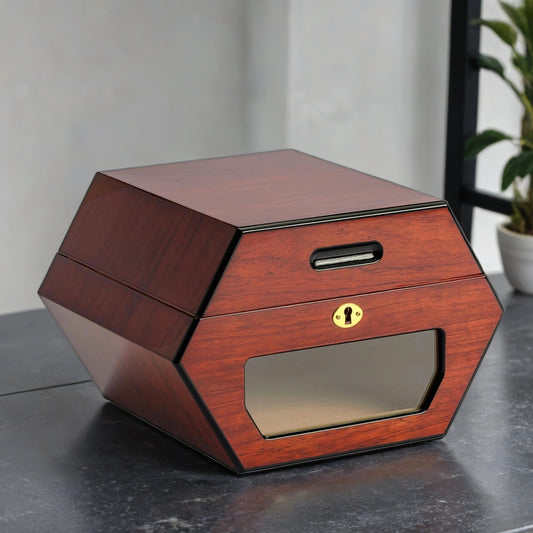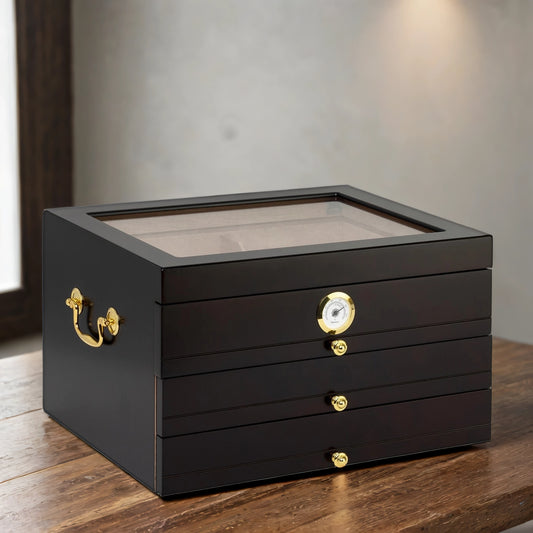
Should You Store Cigars in Cellophane? Pros and Cons
For cigar enthusiasts, one of the age-old debates is whether to store cigars in their cellophane wrappers when placing them in a humidor. While this might seem like a minor detail, it can actually impact how your cigars age, how they taste, and even how well they stay protected. If you’re wondering whether to peel that plastic off or leave it on, you’ve come to the right place.
In this article, we’ll dive deep into what cellophane is, how it works, and whether or not it belongs in your brand new humidor. If you’re still in the market for that humidor, our guide to the best rated cigar humidors in 2026 of the year highlights the top rated options that store cigars properly, whether you keep the cellophane on or off.
What is Cellophane?
Before we get into the nitty-gritty, let’s start with the basics: what is cellophane anyway? Contrary to popular belief, it’s not just glorified plastic wrap. Cellophane is made from cellulose, a plant-based material that’s biodegradable and breathable, allowing for some air and humidity exchange while still protecting the cigar.
The purpose of cellophane is simple: protection. During shipping, handling, and even when stored in a humidor, cellophane helps shield cigars from bumps, bruises, and flavor contamination. And unlike plastic, which can seal in too much moisture, cellophane allows cigars to “breathe”—just not as freely as an unwrapped cigar would.
But does that mean you should keep it on when you store your cigars in your humidor? Let’s tackle that.

Do You Take Cigars Out of The Wrapper When Putting Them Into Your Humidor?
When you receive a fresh batch of cigars, the decision to leave the cellophane on or take it off before placing them in your humidor can be tricky. If you leave the cellophane on, you’re giving your cigars extra protection from physical damage and potential flavor contamination. This is especially useful if you’ve got a mix of cigars in your humidor, as the cellophane prevents different aromas from mingling. It also moderates the rate at which the cigars absorb humidity, protecting them from sudden changes and allowing for a slower, more controlled exposure.
On the other hand, removing the cellophane allows your cigars to breathe more freely. This leads to a faster aging process, which can enhance the flavors and aromas over time. For enthusiasts looking to develop the rich, complex character of their cigars, taking the cellophane off lets them fully interact with the humidor's environment. Ultimately, whether you leave the cellophane on or not depends on your priorities—whether you value protection and slower aging, or are eager for faster flavor development and a more immersive humidor experience.
Pros of Storing Cigars in Cellophane
Storing cigars in cellophane comes with a few key advantages, the most obvious being physical protection. Cigars are delicate, and their wrappers can easily get scratched, torn, or damaged when moved around in the humidor. Cellophane acts as a protective shield, making it particularly useful if you tend to open your humidor frequently or have to move your cigars around.
Another benefit of keeping cigars in cellophane is that it prevents flavor cross-contamination. Cigars, especially when stored together, can absorb each other’s aromas and flavors. Cellophane creates a barrier that helps maintain the unique characteristics of each cigar, making it ideal for those with a diverse collection in their humidor.
Cellophane also slows down the humidity absorption process, which can be beneficial in some cases. When cigars take in moisture too quickly, they can become overly spongy, affecting the burn and overall smoking experience. By providing a gradual exchange of humidity, cellophane protects cigars from rapid environmental changes, allowing them to acclimate to the humidor’s conditions in a more controlled way.
Cons of Storing Cigars in Cellophane
While cellophane provides protection, it also comes with a few downsides, particularly when it comes to aging cigars. One of the main disadvantages is that it slows down the aging process. Since cellophane restricts airflow, cigars don’t age as quickly or develop as rich a flavor profile as they would without the wrapper. For enthusiasts who prioritize faster, more intense flavor development, storing cigars in cellophane may hinder the aging experience.
Another drawback is that cigars wrapped in cellophane won’t interact with the humidor environment as much, leading to less flavor and aroma enhancement. Removing the cellophane allows cigars to fully breathe and absorb the nuances of their surroundings, which can result in more complex and enjoyable flavors.
Additionally, there’s something aesthetically pleasing about a humidor filled with unwrapped cigars. For many, the visual and sensory experience of opening a humidor full of unwrapped cigars adds to the enjoyment of cigar collecting.

Does Cellophane Impact the Flavor of Your Cigars?
The question of whether cellophane impacts the flavor of cigars is a common concern for enthusiasts, and the answer is both yes and no. On the surface, cellophane is a neutral material that doesn’t directly interact with the tobacco or infuse the cigar with any foreign tastes. So, in that sense, cellophane does not inherently affect the flavor of a cigar. However, what cellophane does impact is how a cigar ages and breathes over time, which can indirectly influence the flavor profile.
When cigars are left in cellophane, the aging process is slowed due to the restricted airflow. This can result in a more gradual development of flavors, which might appeal to those who prefer their cigars to maintain a more stable, predictable profile over time. However, for those seeking a richer, more complex flavor that develops faster, removing the cellophane allows the cigar to interact fully with the humidor environment.
Finding the Right Approach for Your Humidor
At the end of the day, whether or not to store cigars in cellophane comes down to personal preference. If you’re looking for maximum protection and a slower aging process, leave the cellophane on. If you’re after quicker aging, enhanced flavor, and a more aesthetically pleasing humidor, take it off.
Ultimately, there’s no wrong answer here—just the one that works best for you. Try experimenting with both methods and see which one suits your cigar preferences and storage habits. Whatever you choose, just make sure your cigars are kept in a well-maintained humidor, because the best cigar is a fresh cigar.

